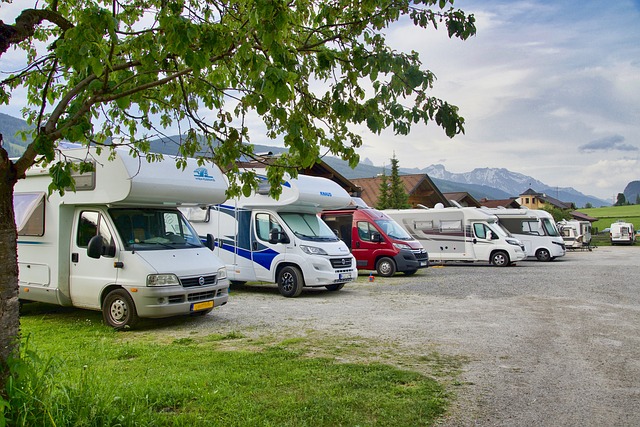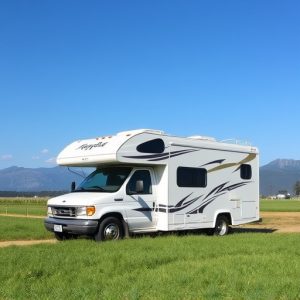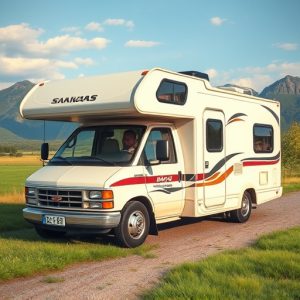Smooth Sailing: Expert RV Route Planning and Navigation Tips for Stress-Free Travel
Planning an RV trip requires strategic route selection and navigation, considering your vehicle…….

Planning an RV trip requires strategic route selection and navigation, considering your vehicle's size and weight to avoid low overpasses and narrow passages. Use specialized mapping software for large vehicles to find optimal routes that accommodate your RV's dimensions and identify suitable campgrounds. It's essential to factor in road conditions, elevation profiles, weather patterns, and campground availability, as well as planning for regular maintenance of your RV systems like propane, water, batteries, and waste management. To enhance your journey, leverage RV travel tips gathered from experienced travelers and online communities, which can guide you on managing the unique driving characteristics of an RV and incorporating necessary rest breaks. Always be adaptable, with a backup plan in case of unexpected changes or detours, and monitor weather forecasts to ensure a smooth and safe travel experience. Embracing these RV travel tips will help you navigate diverse destinations comfortably while maximizing the joy of your exploration.
Embarking on an RV journey offers a unique blend of adventure and comfort. To ensure your travels are as seamless as they are enjoyable, mastering route planning and navigation is key. This article serves as your comprehensive guide to RV travel tips, encompassing the essentials for efficient journeying. From understanding your RV’s specific needs to leveraging advanced GPS features, each section provides valuable insights to enhance your experience on the road. Whether you’re a seasoned RVer or new to this mode of exploration, these strategies will elevate your travel from ordinary to extraordinary, ensuring every mile is as picturesque as the destinations themselves.
Mastering RV Route Planning: Strategies for Efficient Journeys

Embarking on an RV trip offers a unique blend of adventure and comfort, allowing travelers to explore new destinations with the conveniences of home in tow. To ensure a seamless journey, RVers must carefully plan their route before hitting the road. This involves considering factors such as road conditions, elevation profiles, weather forecasts, and campground availability. Utilizing specialized mapping software tailored for RVs is pivotal; these tools offer routes that avoid low clearance bridges and narrow roads, which can be a common pitfall for large vehicles. Planning your route in segments also allows for flexible itineraries, accommodating spontaneous changes or unexpected detours without compromising safety or comfort.
Another critical aspect of RV route planning is understanding the limitations of your vehicle. Knowing the exact height, width, and weight of your RV helps in selecting roads that can handle its size and load. Factoring in parking size constraints at overnight stops ensures a restful night’s sleep without the stress of maneuverability issues. Additionally, planning for adequate service station visits is essential to maintain your RV’s systems, including propane, water, battery charge, and waste management facilities. By integrating these RV travel tips into your route planning process, you can anticipate and mitigate potential issues, leading to a smoother, more enjoyable travel experience.

Embarking on an RV travel adventure requires careful route planning and navigation to ensure a smooth journey. Before hitting the road, research your destination thoroughly. Utilize RV-specific maps and apps that cater to the size and weight limitations of your vehicle. These tools can help you identify suitable rest areas, campgrounds, and roads that accommodate your RV’s dimensions. Planning your route with these considerations in mind will prevent potential clearance issues under bridges or through tunnels, saving you from costly and time-consuming detours.
Furthermore, account for the RV’s driving dynamics by allowing extra travel time, especially on long journeys. Factoring in rest breaks is crucial for maintaining alertness and avoiding fatigue. Engage with online RV travel communities to gather firsthand tips from fellow travelers; their experiences can be invaluable. Additionally, always have a backup plan and stay updated on weather conditions that may affect your route or travel pace. By combining these RV travel tips with meticulous planning, you’ll enhance your trip’s safety and enjoyment, allowing you to focus on the sights and sounds of the open road.
Embarking on an RV journey offers a unique blend of adventure and comfort, and with the right route planning and navigation, your travels can be both seamless and enjoyable. This article has provided valuable insights into mastering RV route planning for efficient journeys, ensuring you make the most of your RV travel experience. By considering road conditions, campground availability, and attractions along your path, you’re set to navigate with confidence. Remember to utilize technology, such as GPS and route planning apps tailored for RVs, and always be prepared for unexpected detours. With these RV travel tips in hand, the open road awaits your discovery. Safe travels!







